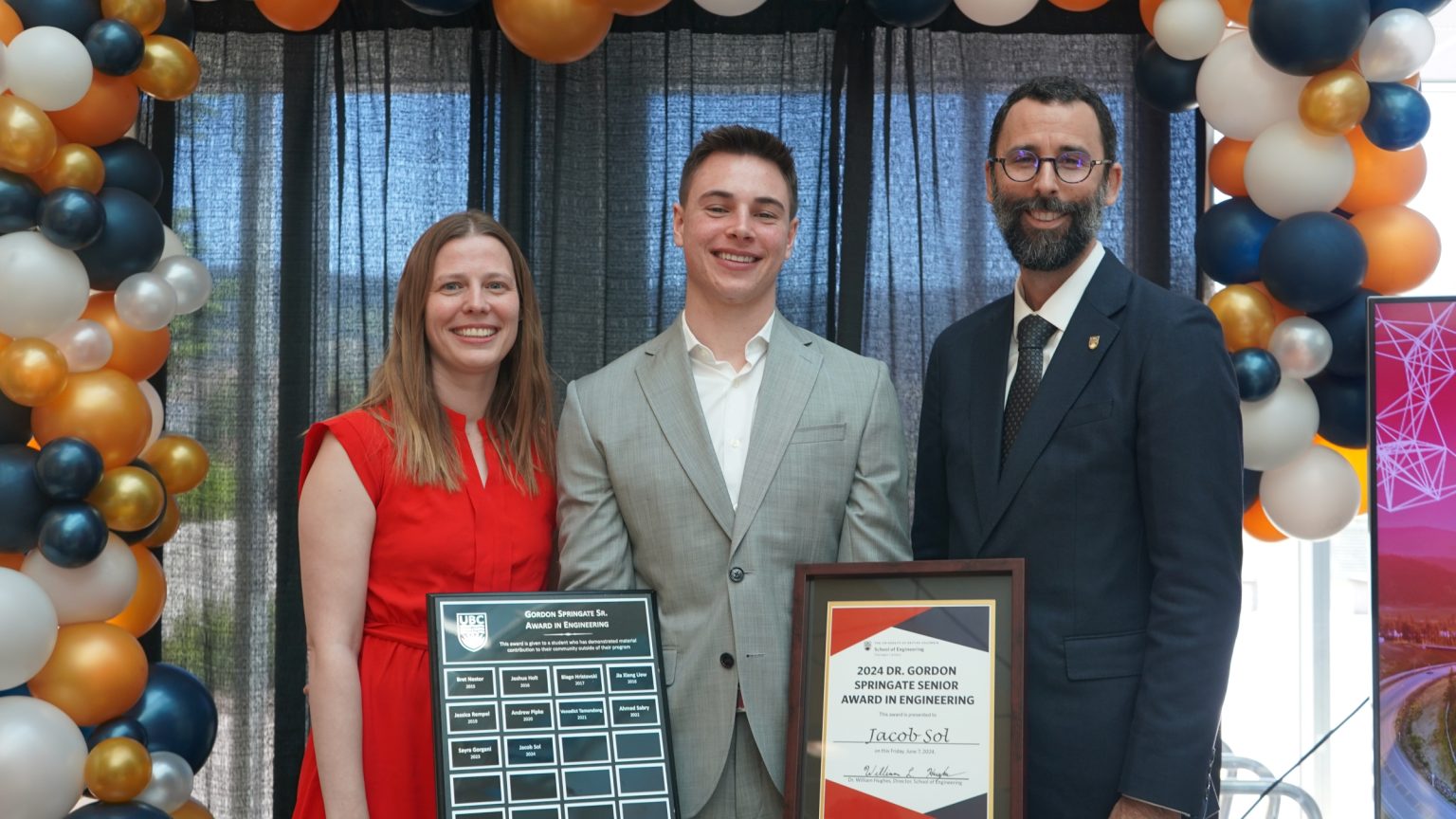
Dr. Sabine Weyand (L) and Dr. Will Hughes (R) present the award to Jacob Sol (Centre).
When Jacob Sol stepped into his first engineering class at UBC Okanagan he had no way of knowing that five years later he’d be off to one of the top grad schools in his field, having kickstarted a research project that is inspiring people near and far to protect our fragile, interconnected water systems.
On Friday, June 7, Sol crossed the stage to pick up his Bachelor of Applied Science in Civil Engineering. He was among the more than 430 of his engineering peers to earn credentials last week, and one of the more than 2,000 new graduates of UBC Okanagan.
In addition to his parchment, Sol also received another incredibly important catalyst for his future on graduation day: the 2024 Dr. Gordon Springate Sr. Award in Engineering.
The Dr. Gordon Springate Sr. Award in Engineering is annually bestowed on a student completing their Bachelor of Applied Science degree in the School of Engineering who has demonstrated a material contribution to their community outside of their program. The $15,000 award – the single largest donor-funded award through endowment for an undergraduate student in the School of Engineering at UBC Okanagan – is named for Dr. Gordon Springate Sr., an electrical engineer and educator who was deeply committed to giving back to his field and his community. This year marks the 10th year (and 10th recipient) of this award – which was initiated by the generosity of UBC alumnus (’81) Gordon Springate (his son).
For Sol, the award is powering his dream of graduate studies at the Delft University of Technology (TU Delft), the oldest and largest Dutch public technical university, located in Delft, Netherlands.
“TU Delft is one of the top schools in the world for water engineering,” explains Sol, who moved to the Okanagan from Langley to attend UBCO. “For me, it’s a life-changing opportunity, and one I wasn’t sure I was going to be able to pursue without this award. I’m incredibly grateful to the Springate family for this support, which is helping to make my dream possible. It’s going to make a huge impact on my life.”
True to the intentions of the award, Sol’s time at UBC has been spent making an impact.
During his first semester at UBCO in Fall 2020 – a time when the world was grappling with COVID-19 – Sol was laser-focused on another threat to our world.
“It dawned on me early in my studies that stormwater contamination is a hugely significant environmental issue, both in our local communities and worldwide. With our water systems being so precious in the Okanagan, and all over the world, I saw there was a need and a way for me to make a positive impact,” explains Sol, who credits his father – who worked at a marina – for inspiring him to take an interest in the ocean and aquatic environments from a young age.
He and his company developed the idea for a smart integrated stormwater decontamination and flood monitoring device which allows for real-time data collection to allow for informed decision making.
Sol and his classmates would go on to work with members of the Okanagan Basin Water Board (OBWB), OVIVO, a water and wastewater treatment and purification company, Purppl, the City of Kelowna, and the City of Kelowna’s primary aquatic consultant, Larratt Aquatic, to curate a product that would be most beneficial to the community and meet all the project goals. In June 2020, Jacob’s team presented the GAPS System in the final AquaHacking pitch competition and were awarded second place in all of western Canada.
The reach and impact of the project has already been impressive.
Through the AquaHacking program, the program has reached and educated over 50,000 people about this important topic. Sol is currently in the process of patenting the design with the hopes of rolling it out to communities in the near future.
Along the way, Sol balanced keeping the research project afloat while maintaining outstanding grades and being a member of the UBCO Men’s Heat Soccer team.
“It’s not always easy juggling everything, but my time at UBCO has been rewarding because I’ve had these opportunities to get involved outside the classroom,” says Sol. “I’m very proud I’d been able to make an impact through the research project and I hope through my graduate studies I’ll be able to continue to build on the idea, and ultimately make an impact in communities around the world.”